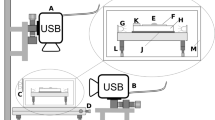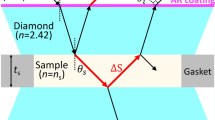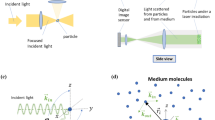Abstract
WHEN a concentration gradient in a vertical column of solution, for example, an ultracentrifuge cell, is investigated by a refraction method, it is desirable to obtain a diagram relating the refractive index gradient with height in the column of solution. The two data, the height and the corresponding gradient, are in the different methods registered along the same vertical axis or along one vertical and one horizontal axis.
This is a preview of subscription content, access via your institution
Access options
Subscribe to this journal
Receive 51 print issues and online access
$199.00 per year
only $3.90 per issue
Buy this article
- Purchase on Springer Link
- Instant access to full article PDF
Prices may be subject to local taxes which are calculated during checkout
Similar content being viewed by others
References
Lamm, O., Z. phys. Chem., A, 138, 313 (1928); A, 143, 177 (1929). Nova Acta RegiÅ" Societatis Scientiarum Upsaliensis, Ser. IV, 10, No. 6 (1937).
Tiselius, A., Pedersen, K. O., and Eriksson-Quen sel, I.-B., NATURE, 139, 546 (1937).
Philpot, J. St. L., NATURE, 141, 283 (1938).
Svensson, H., Kolloid-Z., in the Press.
Author information
Authors and Affiliations
Rights and permissions
About this article
Cite this article
ANDERSSON, K. A New Refraction Method for Obtaining Photographic Records of Concentration Gradients. Nature 143, 720–721 (1939). https://doi.org/10.1038/143720a0
Issue Date:
DOI: https://doi.org/10.1038/143720a0
This article is cited by
Comments
By submitting a comment you agree to abide by our Terms and Community Guidelines. If you find something abusive or that does not comply with our terms or guidelines please flag it as inappropriate.



